Spirou 5: The Marsupilami Thieves
Cinebook (English), 64 pp.
Having captured a Marsupilami in the jungles of Palombia, Spirou and Fantasio feel bad about putting the fabulous creature behind bars, and make plans to free it from the zoo. Before they get a chance, however, the animal is stolen, believed dead. Spirou and Fantasio have to chase the Marsupilami Thieves through Europe, finally coming to a showdown at the Circus Zabaglione.
For its fifth Spirou release, Cinebook jumps back to André Franquin’s classic run on the series, starting with one of his early albums: The Marsupilami Thieves (Les voleurs du Marsupilami), from 1952. Franquin, of course, is one of the great comic creators of the era, easily on par with Hergé (Tintin) or Carl Barks (Uncle Scrooge). However, I have to admit that I don’t consider this to be among his better works. (This review contains minor spoilers.)
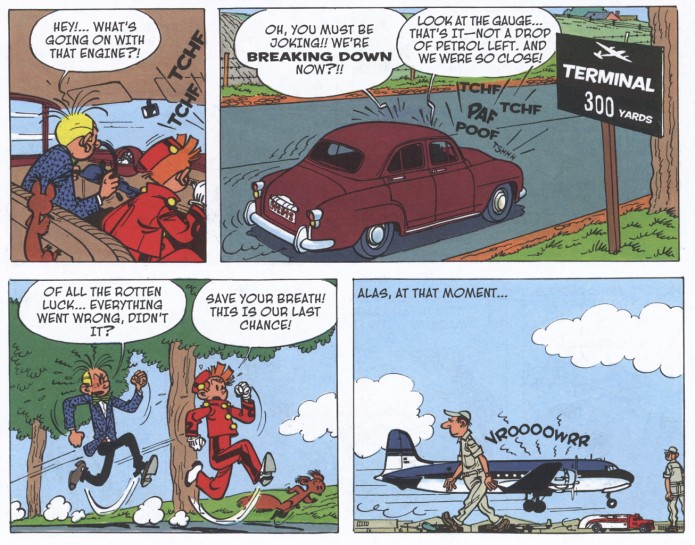
When he began The Marsupilami Thieves, Franquin had worked on The Adventures of Spirou & Fantasio for six years. Most of his stories had been shorter, standalone episodes, but with his last two (There’s a Sorcerer in Champignac and Spirou and the Heirs) he had tried his hand at album-length narratives, though he still fell back on dividing them into several distinct parts. In The Marsupilami Thieves, Franquin is still working out how to tell longer, unified stories, and starting to introduce the continuity and recurring characters that would come to define the universe of the series.
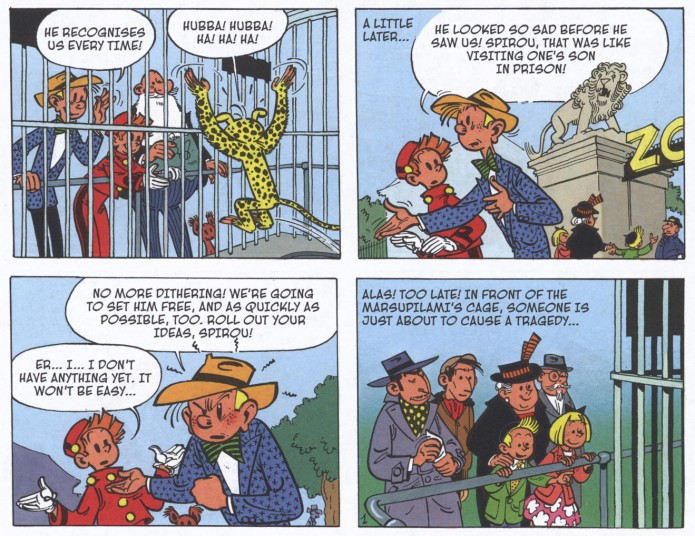
The story springs from Franquin’s concern about the treatment of animals. An admirer of exotic creatures, he was drawn to the zoo and the circus, but repulsed by the way wild beasts were kept in captivity and often ill-treated. So having had Spirou and Fantasio capture a Marsupilami in Spirou and the Heirs, Franquin wasn’t sure what to do with it. The obvious thing once it had served its purpose in the story was to put it in a cage in a zoo and forget about it, but the author didn’t like that ending. Alternatively, the heroes could return it to the jungle where they found it; but they had just been to Palombia, and Franquin, who preferred to make each adventure as different as possible from the last, didn’t think it was a good idea to send them straight back there. The solution came in the form of an idea by his old friend, Georges “Geo” Salmon (who is credited under the pseudonym Jo Almo): Have the Marsupilami be kidnapped by a circus, so that Spirou and Fantasio have to rescue him. Who knows, it might even stick around for future adventures…
The commitment to animal welfare is apparent in the depiction of the Marsupilami languishing in captivity and in the portrayal of the unsympathetic circus director, but Franquin and Almo’s script steers clear of politics in favor of a light – perhaps even slight – adventure. (The mildness of the social criticism is demonstrated by the fact that a sequence from the album was later repurposed into a circus promotion.) Where the two preceding albums feature high excitement, with mysterious events, fantastical creatures and incredible inventions, the setting and plot here are more prosaic: Spirou and Fantasio try to catch a plane at the last minute, they tangle with customs agents, they go to a football match and to the circus. Still, out of this not entirely promising material, Franquin manages to create some great set-pieces that provide the clear high-points of the album.
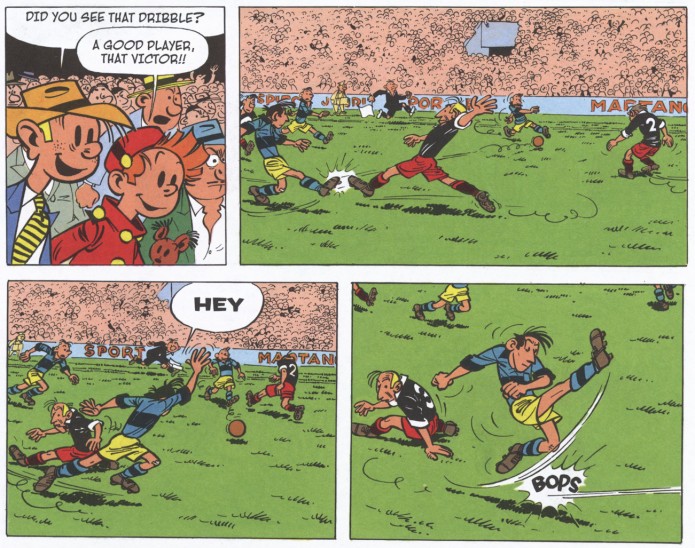
It’s a shame that the story tying them together is so weak, with a number of plot holes and flaws in the logic glossed over. (To take just a minor one: Although Circus Zabaglione is a touring circus, it spends weeks or months on end in the same town.) The characterization does involve some interesting ambiguities, like the fact that Spirou and Fantasio were themselves planning to steal the Marsupilami from the zoo, and that they go on trying to steal him back from the circus rather than alerting the authorities. The title, then, could just as well refer to the heroes as to the villains… and in fact, the actual Marsupilami-napper is portrayed rather sympathetically. However, this attempt at nuance tends to weaken the central conflict, and leads to several jarring lapses in motivation. The ending is particularly egregious in this regard, and so abrupt as to leave an unsatisfying number of loose ends.
Fortunately, with a Franquin album you can always count on the art. Rather than spending too many words trying to describe it, I’ll just refer to the images, where you can see his talent for yourself. Obviously Franquin’s style, while already very recognizable at this stage of his career, is not yet mature, and remains quite simplistic compared to the work he would come to do at the top of his powers. Nevertheless, this is one of the masters of Franco-Belgian comics beginning to come into his own, and the dynamic illustrations are one of strong points of the album.
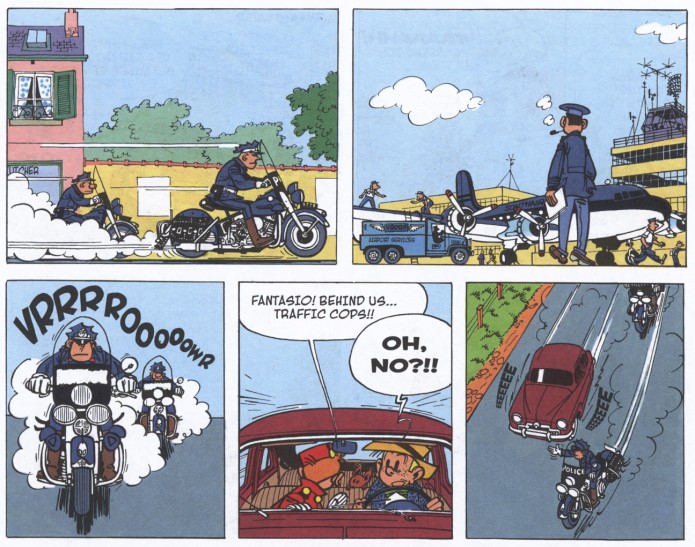
Even aside from the fact that The Marsupilami Thieves is not, in my opinion, as good an album as the two immediately preceding it (or the ones that follow, for that matter), this is an odd place for Cinebook to start publishing old-school Spirou. The Marsupilami Thieves is a pretty direct sequel to Spirou and the Heirs, and begins practically mid-sentence. The story also relies on some details from There’s a Sorcerer in Champignac as a plot device, even telling readers in an explanatory panel to refer to the earlier album. Awkward, since Cinebook hasn’t published it yet.
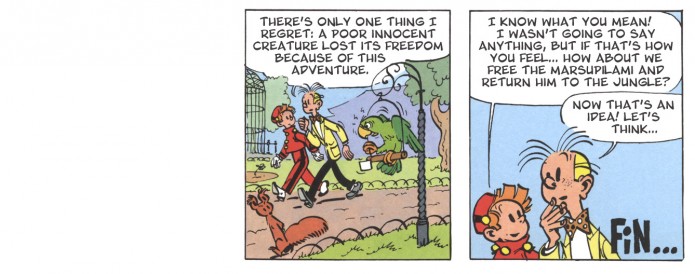
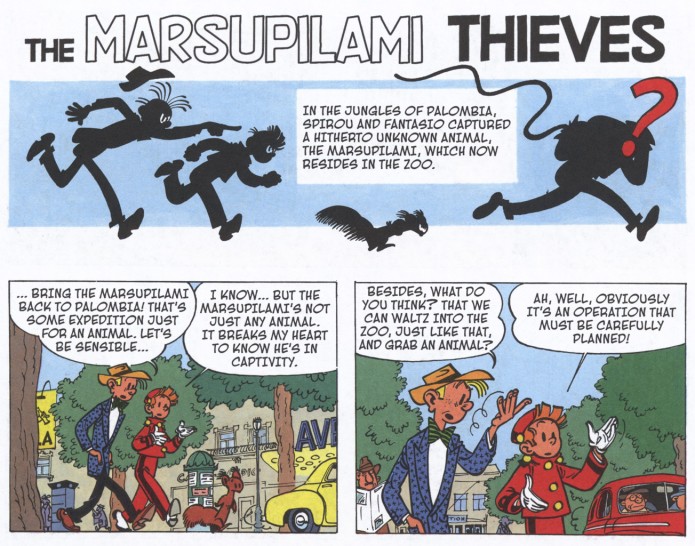
(The time in between is covered by these two pages.)
However, taken on its own, the English edition is quite decent. It features a solid translation by Jerome Saincantin, following the original French closely. The lettering is relatively good, although the dialogue font chosen uses the “crossbar I” throughout, giving it something of an amateurish look. Shouts and sound effects are in a bold font that is relatively close to the original lettering, but suffer from flattening all the curved paths and evening the letter sizes, creating boxy blocks of text that are neither particularly expressive nor attractive. Still, the simplification is understandable, as doing it properly would be much more time-consuming.
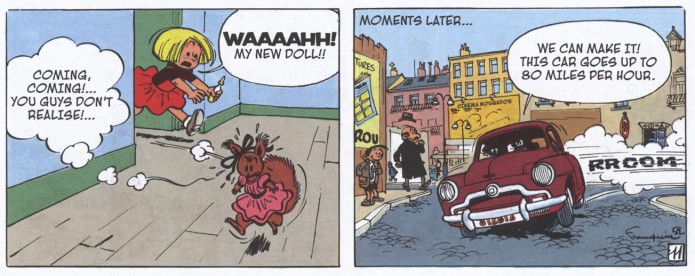
The album is, as usual for Cinebook, printed on matte paper and bound in soft covers. My only real complaint is that the paper is rather thin, so that whatever is on the back of the page is often faintly visible through the page you’re trying to read. No doubt the paper weight and the corner-cutting when it comes to some of the lettering are ways to keep costs down, and I’m happy to accept it if it can get the album in the hands of more readers.
Finally, Cinebook has included one notable extra: a three-page afterword that presents the history of the series, from Rob-Vel to Yoann & Vehlmann. While fans won’t learn anything new, it’s a nice intro for new readers. Another page shows the five Spirou albums already released, as well as the upcoming titles Spirou in Moscow and The Rhinoceros’ Horn. The publications are starting to add up!
As it happens, this is not the first time this album has been released in English; it was published in India in 2007 by Euro Books (a subsidiary of Egmont), under the title The Marsupilami Robbers. That makes a side-by-side comparison possible, and the assessment is definitely in Cinebook’s favor. The two albums are physically similar, except that the Euro Books version is printed on glossy paper. While this can lead to glare (glossy vs. matte is very much a matter of taste), the paper at least doesn’t suffer from the see-through problem in the Cinebook edition. Euro Books has also added a character intro page (like in Asterix), with Spirou, Fantasio, Spip, the Marsupilami (which they, for some unaccountable reason, have renamed “Beastie”) and the Count. However, the Indian version is inferior where it most counts. The translation is often stilted and sometimes bizarre, and the lettering is truly abysmal. It puts the minor shortcomings of Cinebook’s new edition in perspective.
Comparison of Cinebook’s and Euro Book’s versions with the originals.
This is not the album I would personally have chosen to start off publishing Franquin’s Spirou with, but there are certainly others who rank it higher. Regardless, Cinebook deserves credit for finally making one of the great, classic Franco-Belgian comics widely available in English, and for doing it rather well. It’s a great way to mark the 75th anniversary of the series. Here’s hoping to see the following albums in the not-too-distant future: It only gets better from here!

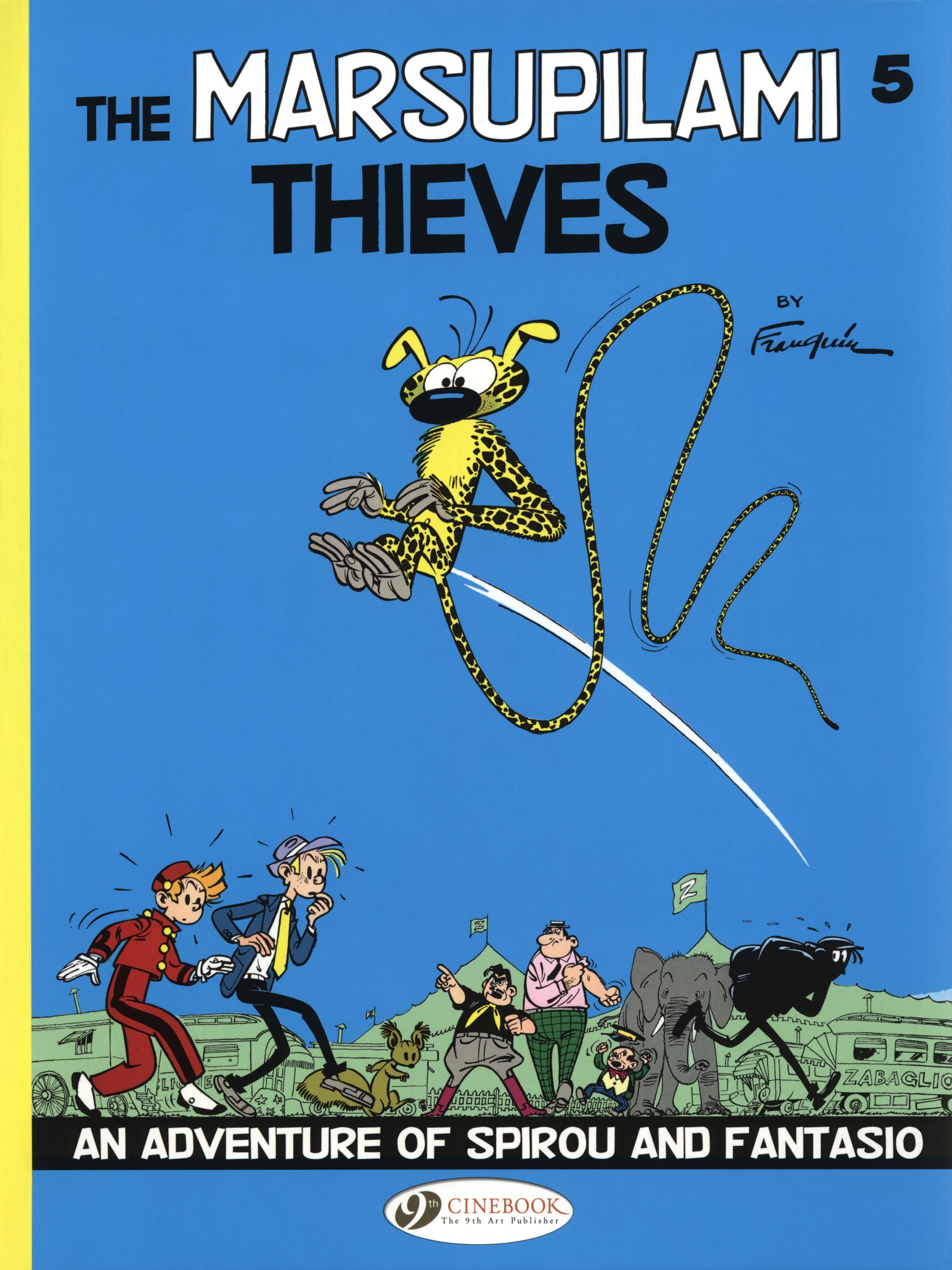
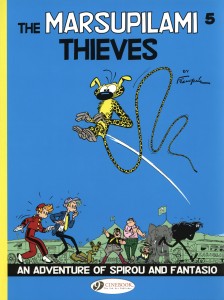
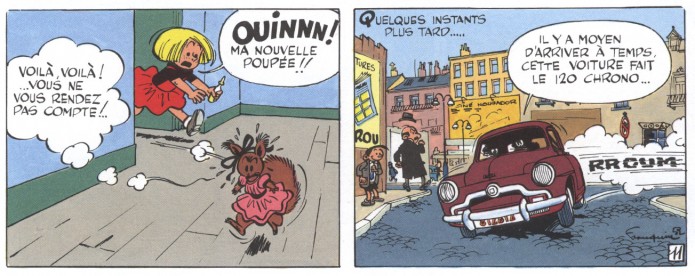
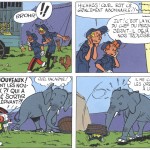
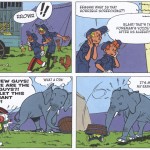
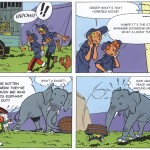
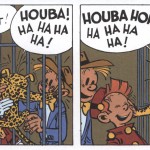
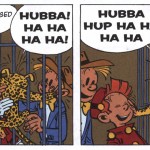
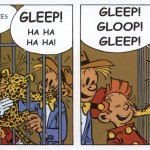

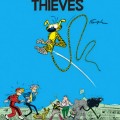
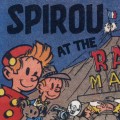
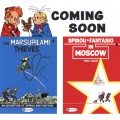

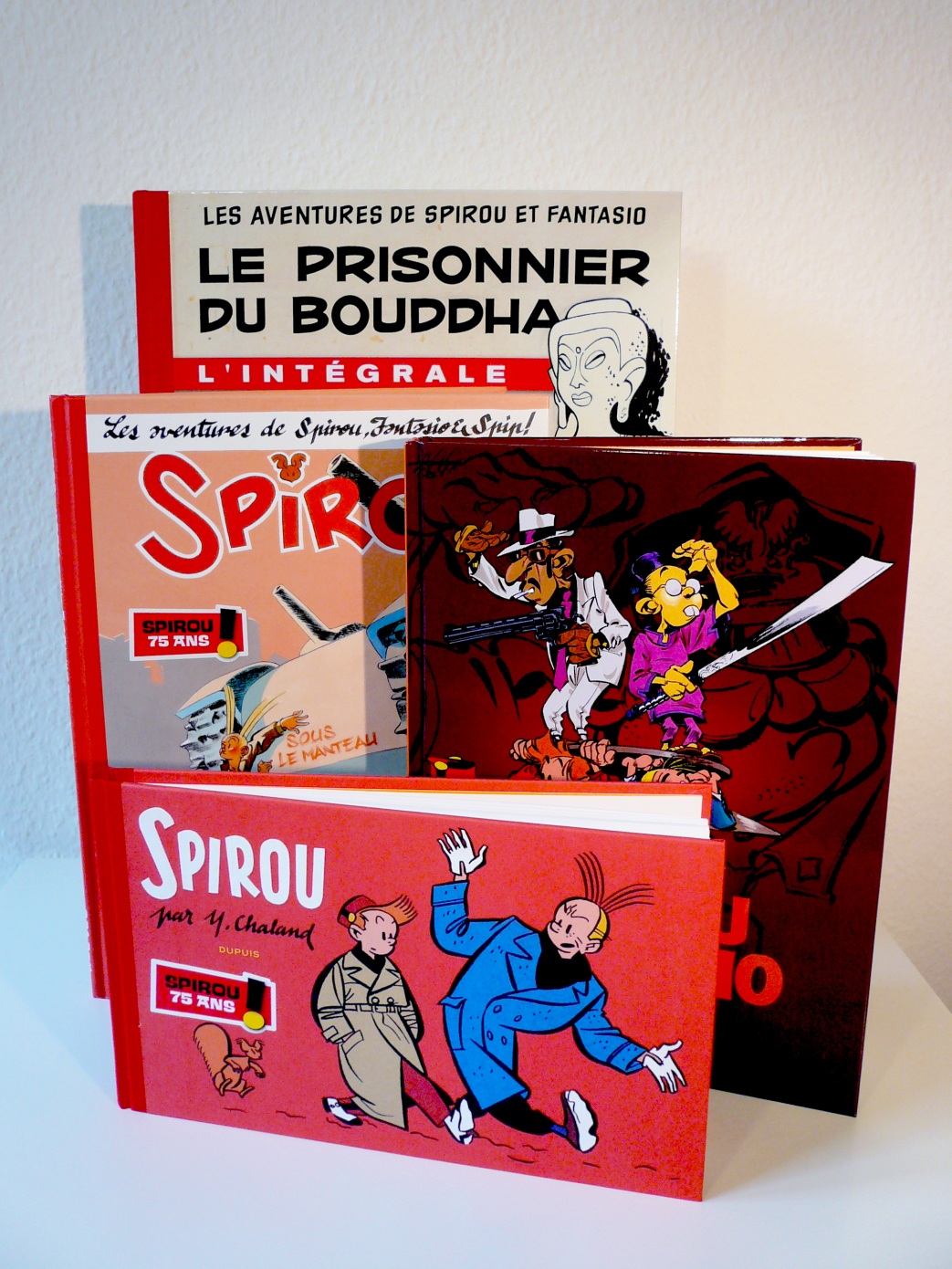

Nice review. I agree, this album is an odd place to start Franquin’s collection – “The Heirs” would have been a more logical choice, and the story is much stronger amd more adventurous. What really bothers me though, is Cinebook’s translation itself – in general, their translations of Spirou are far too literal, too close to the French. With this in mind, these albums in English just can’t stand up to Bell & Hockridge’s “Asterix” titles, or Lonsdale-Cooper & Turner’s “Tintin” – which I think is doing Franquin a great disservice. (And the Marsupilami saying “hubba hubba” – what are they thinking??!!?!?)
Mathias Lorenz liked this on Facebook.
Karl Magnus Wallin liked this on Facebook.
Helge Kvingedal liked this on Facebook.
Seyeon Juhnn liked this on Facebook.
I agree with just about everything you say (and said much of it in my piece on the book), though I emailed Jerome to ask about the odd place to start on the Franquin books and he said this was at the request of Dupuis. In any event, I’m thrilled that these are starting to come out and any small issues I may have are trivial next to that. Great review.
Thanks, ECR! The Spirou part of your latest roundup hasn’t been posted yet, has it?
Nope, not yet. I’ll post it soon as it goes live.
Euro Comics Roundup liked this on Facebook.
Cinebook’s translations are very variable, Sarah, but I think Saincantin is generally OK. I agree that he sticks closer to the French than necessary, but the English tends to at least make sense, even if it’s not as natural as it could be. So in the samples here, there are only a few things that would stick out to me if I wasn’t specifically looking for gallicisms. Though since I’m not a native speaker, I don’t necessarily have the [i]sprachgefühl[/i] to pick up on all the other little nuances.
(Examples of infelicitous translations I notice in these samples include Spip’s “You guys don’t realise!” and the foreman unnecessarily shouting “The new guys!” Plus I really wish they would call it “A Spirou and Fantasio Adventure” or just “The Adventures of Spirou and Fantasio” rather than “An Adventure of Spirou and Fantasio”, which sounds completely unnatural to me. But overall, I find this much less disruptive than Euro Book’s looser version, which occasionally goes disastrously wrong.)
While the best possible translation is always nice, of course, is it as critical to Franquin’s Spirou as to Asterix, or even Tintin? I don’t have the impression that the series involves as much wordplay and verbal humor, but maybe I’m just not aware of it because of my very limited French? Is there some particular quality of the language we’re losing?
I’m also sympathetic to the translator because I know from my experience with the scanlations on this site how tricky it can be to find the right words, particularly when English is not your first language. In my opinion, the biggest thing that detracts from the experience of Cinebook’s Spirou releases is the paper quality. The easiest/cheapest thing to fix would be the lettering, even if it’s just using the crossbar I correctly (some of their other books, e.g. Valerian, already do).
María Remersaro García liked this on Facebook.
Having no Franquin experience other than the Fantasy Flight book from 15/20 years ago I thought I’d be disappointed at joining the adventure halfway through. In the end I didn’t feel like I missed a thing as the introduction gave me enough to dive right in. It was hardly Blake and Mortimer in that respect!
All I did miss was Houba which was, I believe, based on Louis Armstrong taking a breath(?)
I look forward to the next album.
In that Spip doll picture, I think Jijé’s influence is showing heavily…
Damn, I gotta reread Franquin’s stuff soon…
Hi there,
Translator Jerome Saincantin here. I’m a bit late finding this review, sorry, but since I just read it I figured I’d address a couple of the points raised here.
First of all, great review, Mr Reporter! It’s always nice when a review goes in depth, even if it can sometimes be slightly more painful. 🙂
Regarding our choice of this title to begin our Franquin run, as JT said, it was a request from Dupuis. It makes no sense to me, but hey…
As for the quality of our – my – translations, well…
First, all our translations are done as a team. One main translator (mostly me these days), a main proofreader/corrector (a native speaker of the opposite language as the translator), a supervisor in the middle; then two more readers to check the final version and catch mistakes we might have missed. We go back and forth until we’re all satisfied with the translation. All this to explain that we do take the job seriously and do our best; that said, as the main translator, the mistakes and overall style are mine…
Second, I will confess that this title was not one of the ones which clicked immediately for me. For some, the translated text flows naturally, easily. This one… didn’t. It probably shows.
Third, criticism is welcome – even needed! It hurts a bit, but hey. :p I know I can’t compare myself to Anthea Bell, as much as I wish I could. Maybe someday…
So, I hear you about sticking too close to the French. It’s always a complicated exercise, deciding how far from the original text you can stray. Obviously I need to let go more. I’ll keep it in mind.
“A Spirou and Fantasio Adventure” – we’ve already received that comment and this should be corrected in our next title, thanks.
Finally, on ‘houba’… Ok, noted. The animated series used ‘hoobah’ (didn’t know it had been translated, that’d have saved me some grief…), and I guess we will too from now on.
Anyway. I grew up reading Spirou, the series and the magazine, and I love the characters. I do want to, and will keep trying to, honour them by doing as good a job as possible. Hopefully I can do that better in the future.
J.
Hi Jerome! Thanks so much for dropping by and for explaining the Cinebook translation process. (I’m curious how you deal with fitting the text into the speech balloons. Does the texting happen after the translation is done, or is it done step-by-step? Do you ever rewrite something if the first draft doesn’t fit nicely?) Hope you, as a Spirou fan, enjoy the blog.
As mentioned, I sympathize completely with regards to the difficulty of producing a great translation; I know how hard it can be. I’m never totally happy with my own amateur attempts, and I feel a bit out of line criticizing your work when my own efforts have so many shortcomings. As I said, I think you’ve done a solid job, and it’s great to hear you’ll address some of the things pointed out here too.
I saw on Facebook that you’re now working on [i]Spirou in Moscow[/i]. Good luck! It’s one of my favorite Tome & Janry albums, so I’m particularly looking forward to it.
Cool, no pressure, then! :p
I do like what I’ve seen of your blog, yes! I’ll confess to trying as hard as I can NOT to spend too much time on the internet, though – the distracting power of a fine blog is not conducive to making deadlines – so I only read irregularly. Not enough hours in the day… >.<
As for bubble size and text, well, by now we tend to have an eye for what will fit and what won't, so we don't face that overflow problem TOO often. But it does happen every once in a while. The way we work, the translation is done first as I've described previously, then it's sent to the letterer. I'm not entirely sure what exactly happens at that point – it's all very hermetic to me, that part of the process, but I do sometimes get a request for shortening of this text or that sentence. It's usually simple enough, although on rare occasions it requires a reshuffling of several sentences around to get all the informational/emotional content across, even if in a different order…
The good thing is that, on the whole, English expresses things quicker and with less words that French – phrasal verbs, for all that they can be annoyingly confusing (darned prepositions!), are great for that – so we usually end up with a little less text!
Oh, and don't feel bad about criticising my efforts. The thing is, you learn from your mistakes – as long as you realise they're mistakes. Unless stuff like that is pointed out to me, I'll keep thinking it's fine. And there's a fundamental difference between your 'amateur' attempts (one can be an amateur and still darned good at something) and mine: I get paid for it. I don't have the right to complain if people find fault with my work; I only have the right to try and get better…
Jerome, you are a true gentleman. Please let me apologise for my badly-phrased and rather unhelpful comments. How embarrassing: I really feel like the loudmouth in the room!
I first read the Spirou series in French (although it’s not my native language), and seem to have become quite attached to the original text, which isn’t helpful when reading a translation – for me, it’s tempting to compare all the time, and in so doing forget to enjoy the story. I enjoyed your translation of “Spirou in New York”, and think about it every time I eat a frozen pizza…
I can understand about a story not “clicking”, and how that affects a translation. Amateur translators can pick and choose their favourite stories and leave the others for someone else!
Best wishes, and I will endeavour to increase my Spirou collection by supporting Cinebook… 🙂
(I’ve attached my blog link so please feel free to criticise my very amateurish attempts!)
No apology necessary, Sarah – and no harm done!
I know what you mean about constant comparison. For me it’s automatic translation – I can’t read a comic (even a series we don’t do and never will) without a part of my brain providing translations for this sentence or that, or pointing at a bit that’d be extra tricky. It gets very annoying sometimes…
Anyway, thanks for the support, and I hope the newer titles will keep improving in quality! 🙂
(your link seems to have vanished, sorry…)
At a slight tangent to this discussion, but in keeping with the theme, Cinebook have a pair of albums from the 80s Marsupilami spin-off series scheduled for later in 2017.
Both Marsupilami’s Tail and Bamboo Baby Blues are out 21 September (according to Amazon) which is the same day Z is for Zorglub makes its second English language bow (encore?).
George